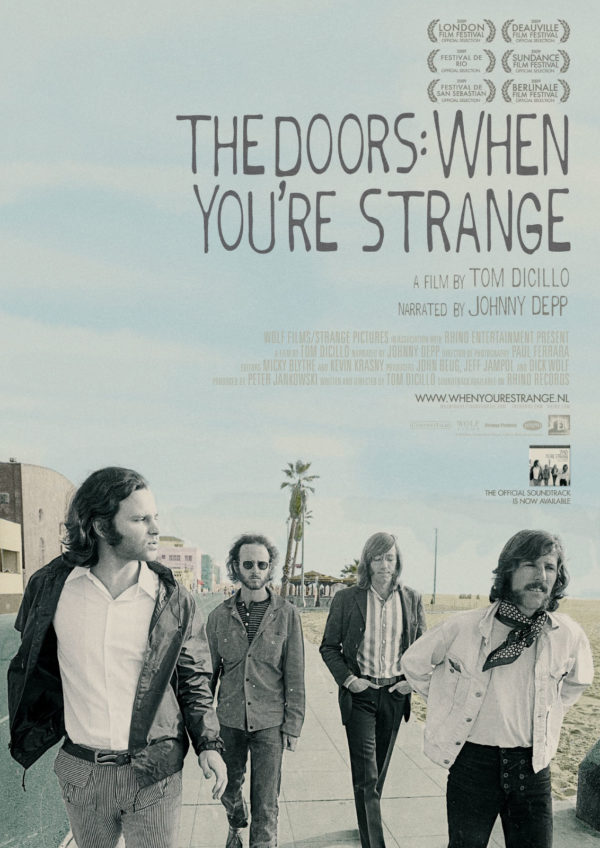The Doors: When You’re Strange (2009)
Oliver Stone’s The Doors hit pavement in 1991, about the time that Generation X were trying to figure out what to do with their post-teen adulthood. It made a huge impression, mainly because The Doors singer Jim Morrison never tried to endorse modern society, only shrugged at it and left it a burning ruin, sort of like Generation X were condemned to do.
This made him fascinating. Unlike the hippies of the 1960s, and like Black Sabbath and The Stooges to follow, Morrison preached apocalypse, albeit in his heavily personal way which bordered on the narcissistic. The tension between his transcendental vision and his narcissistic dependency on popularity was the topic of The Doors, but The Doors: When You’re Strange incorporates it only as a sub-theme to its main focus, which looks at how completely alienated Morrison was from a disintegrating society, and how that over time included his bandmates and intimates, leaving him ultimately bereft of any connection in the years leading up to his death.
Unlike most documentaries, this film eschews atmospheric and contemplative scenes for fast cuts, propelled by extensive short snippets of music and sound bites, telling the complex story of this band with as few moments as possible. Narration guides this development, which feels as a result more like a biography adapted to film, but the result is clear and efficient without leaving out any significant parts of the tale.
What makes this film most interesting is the video of the people who showed up at Doors concerts, protests and hippie events. The Doors — an Irish vocalist, Polish keyboardist with an Asian wife, Jewish guitarist and Irish Catholic drummer — were mostly performing for people like them, namely those of mostly-white heritage with something else mixed in. The crowds are mainly Italians, Puerto Ricans, Irish and Slavic, with relatively few WASP faces scattered in but many more among the police and legal system that ended up taking on Morrison after his behavior became increasingly bizarre and unstable.
It also reveals the perpetual tragedy of rock music which is that music which adapts to the simplistic demands of its audience will eventually in turn become simplistic because the audience is not there for the message, or the depth; they have come to see the spectacle, and to participate in the license which such a spectacle grants, namely the ability to indulge baser instincts and wage vandalism against the dominant culture. The concert shots alternate between the antics of the band and longer pauses on the reactions of the crowd.
In the present day, we inherit the results of the 1960s which really came to fruition in the 1990s. It makes sense for us to engage in a postmortem now, and nowhere can this be more easily done than through the astro-psychedelic antics of The Doors, which both made rock more realistic and also revealed how the audience could not handle any such thing. The Doors self-destructed in the disconnect between expectation and reality, and as our society prepares to do the same, there is much we can learn from this short shallow epic.
Tags: hippies, jim morrison, near-whites, the doors










